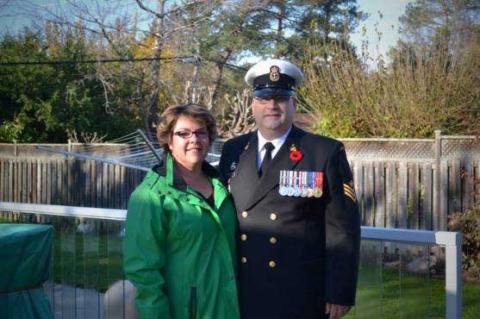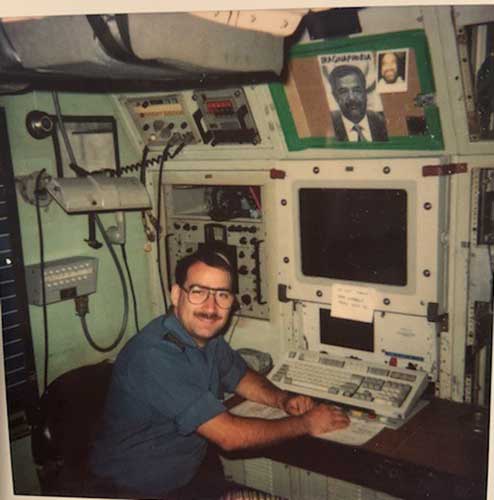
Joined
1986
Postings
- CFB Stadacona
- CFRC Toronto
Key operational experiences
- HMCS Athabaskan
- Gulf War
- Afghanistan
It is December 1990, more than four months after Iraq first invaded Kuwait. The largest coalition of military forces since the Second World War has assembled in the Middle East to stand up for the Kuwaiti people and their freedom.
Tensions are high.
In the Persian Gulf, Canada’s HMCS Athabaskan is helping to secure the waters off Iraq and occupied Kuwait.
On board, young Naval Electronic Sensor Operator Tony Tremblay has just been handed an envelope.
A native of St-Marc de Latour, Quebec, Mr. Tremblay hadn’t grown up envisioning a career in the military, let alone thinking that he would one day go to war.
But when plans to pursue civil engineering studies fell through, he opted to give the Navy a try instead.
Tremblay enlisted in Sept-Iles, Quebec, in March 1986. After completing 14 weeks of basic training in St-Jean-sur-Richelieu, QC, and another nine months of training in Esquimalt, B.C., he was posted to Halifax and the HMCS Athabaskan.
Some might have chosen to fly to the east coast, but Tremblay had other plans.
“I bought a car and drove across the country. Thirteen days, 12 nights. I would never do this again. It was crazy.”
“You have to learn everything. If there’s a fire, you can’t leave. You have to learn firefighting, flood control. You have to learn basically the whole ship, where all compartments are. It’s a lot to learn, kind of a shell shock!”
The Athabaskan was at sea when Tremblay finally pulled into CFB Stadacona in 1987, but before long he would be on board adjusting to life on ship. “You have to learn everything. If there’s a fire, you can’t leave. You have to learn firefighting, flood control. You have to learn basically the whole ship, where all compartments are. It’s a lot to learn, kind of a shell shock!”
On the water, Tremblay adapted quickly. “I wasn’t sick,” he says proudly, “which is a blessing. For people who are sick, it’s just brutal.”
Over the course of his naval career, Tremblay would travel to the Arctic Circle twice, the Caribbean, Europe and Russia, among others.
It was while on vacation visiting family in Baie-Comeau, Quebec, that he found out he would be off to war in the Middle East.

Tony Tremblay on HMCS Athabaskan.
“The phone rang early in the morning. My mom said ‘it’s for you’. I picked up and it’s my boss.”
“You’re going to the Gulf!” he was told.
Tremblay had been specifically chosen for the mission because of his experience on the Athabaskan. In a hurry, he drove back to Halifax and before he knew it, he was at war.
“I remember not being scared at all. That didn’t bother me. I always thought the Navy had the capability to fight against anything that could happen. When you look at it now, we were behind in technology and weaponry, but when you’re 23 years old you just don’t think about the scary and dangerous parts.”
Tremblay was ready for the mission. But no military training could have prepared him for the series of events that would unfold after he opened the envelope that he was handed on that December day.
With Canadian troops off to war for the first time in almost 40 years, individual citizens have been sending messages of support. The Athabaskan is receiving them by the thousands and fate has conspired to put Laurien Gutsole’s letter in Tony’s hands.
The two become pen pals, corresponding back and forth for months while Tony is still at sea. Eventually, they make plans to meet when he gets back to Canada.
The rest, as they say, is history.
“May 10, 1991, he got to Oakville,” Laurien says. “We got along really well so we decided to extend his stay by an extra week.”
That week has turned into 28 years of married—and military—life.
Sure, there have been challenges along the way. Tony’s seven-month deployment to Afghanistan after 9/11 being one of them.
“That trip was the scariest for me,” says Laurien. “The world had suddenly become a much scarier place.”
“The military community, especially in Halifax where I really learned to be a military spouse, the wives and husbands were amazing. Everybody knew if your husband was at sea so someone would come help you out. It’s been a really, really good life.”
But with a strong independent streak and a good support system around her, she managed to make those harder moments work. “The military community, especially in Halifax where I really learned to be a military spouse, the wives and husbands were amazing. Everybody knew if your husband was at sea so someone would come help you out. It’s been a really, really good life.”
Tony retired from the regular forces in 2009 but joined the reserves and has been working at the Canadian Forces Recruiting Centre Southern Ontario Headquarters ever since.
Asked about the highlight of his career, he starts to mention the Gulf War when Laurien, laughing, interjects: “That’s not it, there’s really just one right answer dear,” she says.
In a way they are both right. Without the war, there would have been no letter.
With courage, integrity and loyalty, Tony Trembly has left his mark. He is one of our Canadian Veterans. Discover more stories.
If you a Veteran, family member or caregiver in need of mental health support, the VAC Assistance Service is available to you 24/7, 365 days a year at no cost. Call "1-800-268-7708 to speak to a mental health professional right now.

